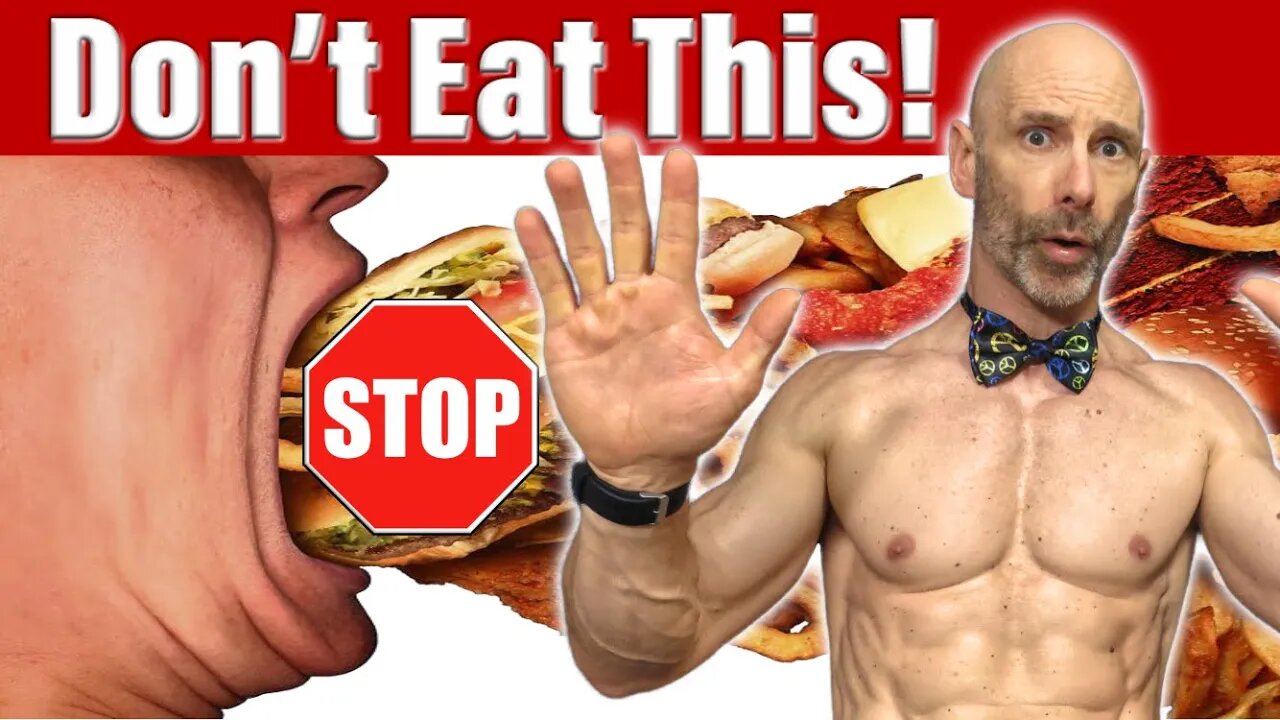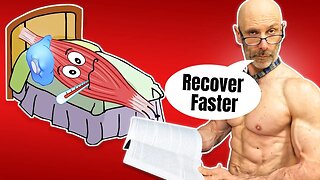Premium Only Content

Foods You Should Avoid Eating Over 50 (Shocking Truth)
Foods You Should Avoid Eating Over 50(What To Eat Instead)
When we were young, it seemed like we could eat whatever we wanted and not gain a pound. Once we’re over 50, we look at a piece of cake and gain weight.
This is because a lot of changes happen in our bodies as we age. Our metabolism starts to slow down. If we don’t adjust our diet and keep eating the same as we did in our twenties, we’ll be overweight.
This is the first and most significant thing we should avoid over 50, the overconsumption of food.
Once we have adjusted our diet to the appropriate quantity, then we need to make sure we are getting enough of the nutrition we required to maintain health and avoid foods that increase the risk of age-related diseases.
Heart disease is the number one killer of men over 50
If you are interested in losing body fat and adding muscle, please email me at 1shark1bite@gmail.com for information on my personal training services.
Check your testosterone levels from home. Just click this link http://trylgc.com/laurence and receive 20% off with code: LAURENCE20 I receive commissions on referrals to LetsGetChecked. I only recommend services I know and trust.
My Affiliate link to Lebert for their Equalizer bars and more; https://lebertfitness.com/?ref=FitAnd50 and use the discount code FITAND50 you will receive 20% off your purchase
Facebook; https://www.facebook.com/Fit-and-50-5...
My Amazon page link; https://www.amazon.com/shop/fitand50
And some foods will increase this risk substantially, like processed meats, including pepperoni, bologna, and deli meats. This is because of the various chemical compounds they contain that aren’t found in fresh meat.
One of these compounds is nitrates. It’s added to preserve the colour of the meat and help it last longer. These are different than the nitrates found in vegetables. Those can be quite good for us.
Nitrates and it’s by-products like pear-oxy-nitrite that are found in processed foods and can promote vascular dysfunction and a-thero-scler-osis, which is the build-up of plaque on your artery walls, often called hardening of the arteries.
The high sodium levels found in processed meats are another risk for our heart. Fresh meats contain very little sodium and no nitrates. Making them a much better choice when part of a balanced diet
Speaking of foods high in sodium brings me to my next food to avoid, and that’s American cheese.
American cheese started as cheddar cheese that was made in America instead of England. It was James L. Kraft, who happens to be Canadian, that gave us the version of American cheese we know today.
He patented a method of processing cheese, so it didn't have to be aged for 3 to 8 months. But in doing so, he added so many ingredients effectively it was no longer cheese, which is why you see his famous cheese slices labelled in stores as cheese food or a cheese product.
One of the ingredients it has a lot of is, you guessed it, sodium. A 100 gram serving of American cheese has over 1600 mg of sodium, the same size serving of cheddar has just over 600.
But cheddar isn’t my recommended swap for American cheese. Its Mozzarella having only 16 mg of sodium and is 50 calories less for a 100-gram serving. Another area it comes out ahead is protein, having 28 grams compared to only 19 for American.
As we get older, we don’t process protein as well as we used to. So we might think that a protein bar is a great way to get a little extra in.
And to be fair, not all protein bars are terrible, but the ones you find by the till when you are paying for gas are just overpriced candy bars.
Depending on where you live, you may not be able to tell what is in your protein bar as they’re allowed to label it a proprietary blend to protect their secret recipe. Which when you read that on a label, it means don’t buy it because you don’t know what you are getting.
These bars often contain artificial sweeteners like high fructose corn syrup, which can lead to insulin resistance, obesity, type two diabetes and high blood pressure.
Some protein bars use nuts and seeds to provide fats, but others use highly processed oils like canola which contains traces of trans fats. This type of fat is connected to an increased risk of heart disease.
If you think a protein bar is mainly protein, think again, most of the time, there is way less protein in it than carbs and fats.
Now, if you're grabbing it for a meal replacement, that might make sense. Still, I would far rather grab some no-fat Greek yogurt for my protein and add in some berries or an apple for my carbs, with a few nuts like almonds or pistachios to provide healthy fats.
This way, I avoid the highly processed additives, and I can adjust my quantities to get the exact macro split I want.
I’m a big fan of whole food eating, but there are a few supplements I use and recommend to those over 50.
-
 4:53
4:53
Fit and 50
1 year ago $0.07 earnedHow to Speed Up Muscle Recovery Over 50 (Recover Like a 20 yr old)
5054 -
 4:19:05
4:19:05
SpartakusLIVE
8 hours agoThe MACHINE locks in for 12-hour POWER stream
23.3K1 -
 1:58:40
1:58:40
Robert Gouveia
7 hours agoJ6 Coverup: Prosecute LIZ CHENEY; NY Judge REJECTS Immunity; Trump Breaks Gag?
103K65 -
 2:22:06
2:22:06
WeAreChange
5 hours agoPSYOP Spreads: Drones Shut Down Airport In New York!
70.4K39 -
 1:31:18
1:31:18
Redacted News
8 hours agoEMERGENCY! NATO AND CIA ASSASSINATE TOP RUSSIAN GENERAL, PUTIN VOWS IMMEDIATE RETALIATION | Redacted
213K377 -
 56:45
56:45
VSiNLive
6 hours ago $5.09 earnedFollow the Money with Mitch Moss & Pauly Howard | Hour 1
68.1K2 -
 52:44
52:44
Candace Show Podcast
7 hours agoMy Conversation with Only Fans Model Lilly Phillips | Candace Ep 122
86K271 -
 LIVE
LIVE
tacetmort3m
7 hours ago🔴 LIVE - RELIC HUNTING CONTINUES - INDIANA JONES AND THE GREAT CIRCLE - PART 5
198 watching -
 26:52
26:52
Silver Dragons
6 hours agoCoin Appraisal GONE WRONG - Can I Finally Fool the Coin Experts?
32.6K2 -
 UPCOMING
UPCOMING
Bare Knuckle Fighting Championship
12 hours agoBKFC on DAZN HOLLYWOOD WARREN vs RICHMAN WEIGH IN
23.5K